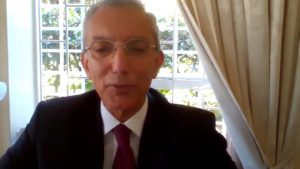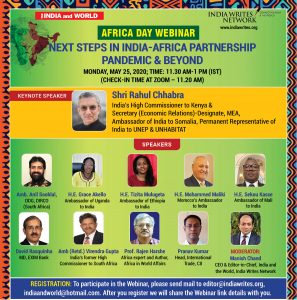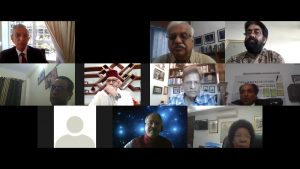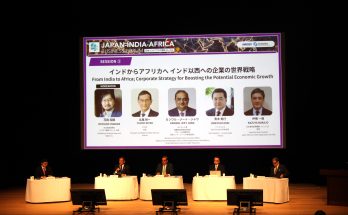India and Africa are set to forge the “defining partnership” of the next decades by jointly combating the coronavirus pandemic and coalescing their strengths to address challenges of the post-Covid recovery and a host of cross-cutting global challenges such as climate change, extremism, counter-terrorism, and transnational crimes.
In a big-picture speech at an international webinar organised by India Writes Network and India and the World magazine to mark the 2020 Africa Day, Mr Rahul Chhabra, India’s High Commissioner to Kenya and Ambassador to Somalia, underlined diverse new areas in which India and Africa will be closely collaborating to usher in a new phase in their multi-faceted partnership. “If it develops very well, we could be on track to be the defining partnership to address the challenges of the changing world, enhancing cooperation in tourism, medicine, governance, S&T, space, IT, education, and mining,” he said. “We have common interests on international issues; UN reforms, counter terrorism, peace keeping, cyber security and energy security.” He also highlighted multifarious collaboration between India and Africa in handling challenges thrown by the pandemic that includes supplying medicines, masks and continuous diplomatic contacts through virtual diplomacy.
The webinar entitled “Mapping Next Steps in India-Africa Partnership: Pandemic & Beyond,” brought together eminent diplomats, experts and thought leaders from India and Africa, cutting together time zones and geographies. The conference focused on enhancing India-Africa cooperation in the immediate context of the pandemic and also in the post-COVID economic recovery. The virtual seminar generated a host of recommendations to map the future trajectory of the India-Africa partnership in accordance with 10 principles of the India-Africa partnership outlined by Prime Minister Narendra Modi in his defining speech to the Ugandan parliament in July 2018.
Mr Chhabra is set to take charge as Secretary (Economic Relations) in India’s Ministry of External Affairs. In this crucial position, Mr Chhabra will be in charge of Africa and will also be India’s Sherpa for BRICS and IBSA. He will also be in charge of India’s development partnership as well as global trade and investment.
Moderated by Manish Chand, Founder-CEO of India Writes Network and India and the World, a pioneering magazine focused on international affairs, the Webinar was addressed by eminent diplomats and experts. This included: Dr Anil Sooklal, Deputy Director General, DIRCO, South Africa; H.E. Mr. Alem Tsehaye Woldemariam, Ambassador of Eritrea in India and Dean of African Group Heads of Mission in India; David Rasquinha, MD, EXIM Bank; H.E. Ambassador of Uganda to India Grace Akello; H.E. Morocco’s Ambassador to India Mohammed Maliki; H.E. Ambassador of Ethiopia to India Tizita Mulugeta; H.E. Sékou KASSÉ, Ambassador of Mali; Amb. Virendra Gupta, India’s former high commissioner to South Africa; Prof. Rajan Harshe, academic and author; and Pranav Kumar, Head, International Trade (CII).
In his welcome remarks, Manish Chand, Founder-CEO of India Writes Network and India and the World, set out key themes of the conference. “Taking a long-range view, the virtual seminar will help map the future trajectory of the India-Africa partnership in accordance with 10 principles of the India-Africa partnership outlined by Prime Minister Narendra Modi in his defining speech to the Ugandan parliament in July 2018.”
Full Text of Keynote Speech by High Commissioner Rahul Chhabra on 25.5.2020 at the Webinar “Next Steps in India-Africa Partnership: Pandemic & Beyond,” organised by India Writes Network & India and the World magazine
Good Morning Ladies & Gentlemen,
Happy Africa Day & Eid Mubarak!
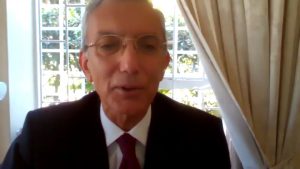
Before I get to the actual course of the seminar, just a little personal note in the interest of full disclosure and complete transparency! Africa has an incredibly special place in my heart. While serving in Senegal, on the west coast of Africa, over 30 years back, both my sons were born in Dakar.
Before we get to the next steps, let me quickly place my talk in context; I will talk about the current situation in Africa, followed by India’s role – how India responded over the last 3-4 months and our interactions last 3-4 years. That will be the second part. The third part will be how it fits in with the AU agenda 2063. We will end with the fourth part – next steps and the motivation for the next steps.
Current Situation
Let us start with the current situation. There is a national lockdown across most of the African continent. Where it has not been a national lockdown like in Kenya, it is dusk-to-dawn curfew. There is a devastating impact on the economy, loss of income, heightened uncertainty, and fear of contagion. We need to keep in mind that this situation will have huge economic, social, technological, and geopolitical impact globally, but more so on the African continent Africa. We need to prepare for that. Most of the countries are LDC countries with high public debt, high budget deficit (over 6%) leading to balance of payments strain. The pandemic here, particularly in Kenya, has come after they just suffered ravages of drought a few months back; they were in middle of floods and locust invasion. On top of that, the pandemic has come. It is not a moment the economy was really ticking a lot. The forecast for Sub-Saharan Africa is a decline of GDP of 2.1 to 5.1%. Just to put in quantitative terms – US $37 billion to US $79 billion is the projected decline. This is also going to be exacerbated with decline in international commodity prices, since the demand for exports is going down; foreign exchange reserves are going to be under great strain.
AU has set up a COVID-19 Response Fund of US $12.5 million contributed by the bureau members of the AU and US $4.5 million for the African Centre for Disease Control. The G-20 Meeting called for a stimulus package; they asked for suspension of interest payments on external public and private debts and there was a request from the AU to not suspend medical supplies.
Now to how India responded immediately. Prime Minister (Modi) spoke telephonically to the President of South Africa, the Chair of the AU; he spoke to the Heads of States/Heads of Governments of Uganda, Ethiopia. He spoke to several African leaders. That was followed up by External Affairs Minister Dr. Jaishankar, who spoke to several Foreign Ministers, including the Kenyan Foreign Minister. These are very reassuring calls; the feedback I received from Kenya where I am currently working, was that in fact they felt extremely reassured after the discussions with our top leadership. So, these calls have had an impact which may not be particularly evident to the general public.
India: Pharmacy of the World
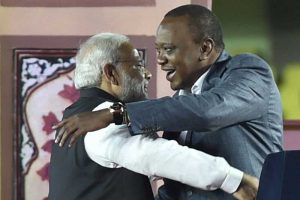
Coming to the second part of our response – India is the pharmacy of the world. We provided medicines to over 85 countries, but more importantly to 32 in Africa; including drugs which were banned for exports because India needed them. There were one-time waivers announced, including for hydroxychloroquine. This was another outcome of the talks between External Affairs Minister Dr. Jaishankar and CS Raychelle Omamo (Cabinet Secretary for Foreign Affairs, Kenya); and in other countries also.
The third part was the request made at G-20 Summit – we committed not to suspend medical supplies and positively consider (as per the norms) the waiver w.r.t. requests from 5 friendly African countries.
Going back a bit from the current situation, is the line of credit offered by the EXIM Bank of India. Africa is the second largest recipient of India’s overseas assistance; we have extended 181 Lines of Credit (LoCs) to 41 countries which, at US $11 billion, is 42% of total amount under LoCs. I now want to bring out an interesting example of how this ties in with the pandemic; we just finished a project, a few months back, inaugurated by President Kenyatta here in Kenya; Rivatex, the largest textile mill on the East African coast. What it has ended up doing today is producing hundreds of thousands of masks, though it was not meant to. LoCs are having these spin off effects and we are getting considerable positive mileage and good publicity with Rivatex manufacturing these masks. In addition, of course, EXIM Bank’s buyers credit facility is over US $1 billion.
During the last 4 years, we set up 6 IT centres, 7 vocational training centres, entrepreneurship centres and a Centre for Geoinformatics Application in Rural Development. hile I was speaking about Rivatex, it also reminds me – this happened a few weeks back in the Kenyan context – wherein we were requested for chlorine for water treatment and that is also being facilitated. Hence, it is not only drugs; it is also chlorine for water treatment, and, FAO requested clearances for movement during the complete lockdown in India; pesticides to be moved out of India and we were able to do that. So, India has not only been helping in the current context with drugs; there are other very important facets.
There is Duty-Free and Quota-Free market access which you are all aware of, which is giving access to African exports. We have investments of US $ 54 billion– we are the fifth largest investor here. These investments are also facilitating African exports to third countries and driving trade. Trade had increased over ten-fold between 2001 and 2014. It has declined recently with the end of the commodity super cycle and it is now US $70 billion; still quite a substantial sum, with quite a lot of scope for further growth. Decline in oil prices has also contributed to that. India is the third largest export destination in Africa.
Coming to our expanded cultural outreach in the last few years: 15 Festivals of India over the last 4 years – 12 for the first time such as in Kenya, Tanzania, Ghana, and Senegal. We are considering a Festival of Africa in India; we are looking at ramping up the Distinguished Visitors Programme. The number of African countries participating in International Surajkund Crafts Mela has been increasing.
We offered 50,000 scholarships over the last five years; over 42,000 have been utilized. Hence, you can see our contribution to capacity building with several thousand Africans coming to India annually for training. We committed US $600 million in grants; in fact, close to US $700 million have been disbursed.
Finally, I would like to highlight, (which sometimes get ignored) links that have been building up for the last few years, may be generations. In Kenya I can speak about five generations, which is diaspora, really a living bridge. This leads me to people-to- people contact. We have offered E-visas to 33 African countries, visas on arrival have been offered to Indians by some of the African countries; air connectivity has improved with new carriers and increased frequency – 8 air carriers are connecting directly to India.
AU agenda 2063
Now to the third part of my presentation on how it links to AU agenda 2063. It is really aligned to India’s growth agenda. This is a particularly good sign. We are looking at cooperation at all levels: continental, regional, and bilateral. At multilateral fora, we connect and collaborate in multiple fields including the Indo-Pacific and IORA. Seriously looking at projects at continental level; there is cooperation in health sector – 20% of India’s pharma exports goes to Africa, Bhabhatrons have been gifted across the continent, including to Kenya and the government really appreciates that. Every time we meet top levels of local governments, we get a lot of credit for Bhabhatron. This is a state-of-the-art cancer detection machine. We are also encouraging joint venture hospitals, as the medical facilities here are weak. Considering collaborating with Africa’s Centre for Disease Control and Medical agencies.
In the field of peace and security, (Manish Chand about that), we could be collaborating in several areas including “Silence the Guns” initiative, African Standby Force and Maritime Security. We gifted naval vessels to Mozambique a few months back. After Congo in 1960, we have participated in over a dozen UN Peace Keeping missions; India is one of the largest contributors of the UN Peace Keeping Force with over 5000 currently based in Africa conducting 5 different operations. Indian women established a landmark with the first all-female Police Unit of the United Nations in Liberia. We have requests for Indian Military Training Teams to be deputed to their National Defence Academies. Hence, in peace and security we have a big contribution.
Mapping of the continental shelf, connectivity, climate change, extremism, counter terrorism, transnational crimes – these are all issues that fit in the Agenda 2063 and India’s agenda.
Next Steps, New Areas
I come now quickly to the next steps – in new areas we can look at collaborating:
- Solar energy where we need to ramp up the International Solar Alliance (ISA). More than half the members are from Africa. We have announced over US $ 1.6 billion line of credit for African members for solar projects.
- Bridging the digital divide: how do you use technology to bridge digital divide? I want to bring again to your attention – in the last few weeks Kenya and Somalia have been participating in the e-ITEC programme. It was launched as a special programme on training on how COVID can be treated for nurses, professionals, health care administrators; over 50 people have benefited in the last few weeks alone by the programme using this e-ITEC platform. All India Institute of Medical Sciences and IIT Madras, India’s premier institutes, are involved in this. It leads me to e-AROGYA and e-VIDYABHARATI which are the medium-term next steps. For five years we are looking at training of 4000 students and 1000 medical professionals-free training on digital platform.
- Traditional medicines: this is an area where even Europe is picking up extremely fast. I think Africa should also try AYUSH – traditional medicines, alternative to allopathic medicines.
- Blue Economy: a remarkably interesting part. A year and a half back, Sustainable Blue Economy Conference was held in Nairobi.
- Trilateral Co-operation: With France we are focussing on ISA; with UAE, IT services in Ethiopia. With Japan we are working on a cancer hospital here in Kenya.
- Study in India: many of you are aware that 13 current/former Heads of State/Heads of Government/Vice-President in Africa have studied in India and over half a dozen current/former Chiefs of Army Staff have trained in Indian military institutions, including current Kenyan Chief of Army Staff. These are all especially important links. In fact, we have an association called ‘Bharatwalas’ (Kenyans having studied in India), members of whom interacted with Prime Minister during his visit to Kenya. Indian States need to focus on countries, e.g. Study in Gujarat team was here a few months back. Within a day and a half, hundreds of Kenyan students had registered!
- Women empowerment
(As Manish Chand mentioned), Prime Minister’s speech in Uganda referring that we will work as per “your priorities”; the part he didn’t mention was that “Africa will remain on top of our priority”. Cooperation will be demand-driven, consultative, participative, sustainable, and not supply driven.
Driving Forces
I come now to the last part. What are the driving forces?
- One of the biggest drivers of this collaboration are the changes in the political arena There is greater respect and commitment to democracy and desire and action to bring about change to a more democratic polity. We have seen how African leaders have worked to ensure smooth transition respecting the will of the people. In effect, the governments are more responsive to the demands of the citizens and to the restive youth clamouring for a voice in their development and progress.
- The desire of Africans to move up the value chain and leapfrog into the fourth industrial revolution-Industry 4.0.
- So that is where the digital divide comes in. Both India and Africa are emerging and rising players. So, they will both construct the next steps.
- On the economic aspect, the continental free trade agreement is the largest in the world after WTO, but I do not know how many of you remember, this week we celebrate one year of its entering into force. Five of the ten fastest growing economies of the world are based in Africa. I am not sure, how much Indian private sector has focussed on the significance of this. This needs to be talked about more in the Indian corporate sector.
- Another big economic change that happened just this week was France cutting off its links with CFA. It was 75 years back when CFA was launched. EXIM Bank might be aware that this will have huge impact on trade and investment flows in that part of the world.
Hence, if it develops very well, we could be on track to be the defining partnership to address the challenges of the changing world enhancing cooperation in tourism, medicine, governance, S&T, space, IT, education, and mining. We have common interests on international issues; UN reforms, counter terrorism, peace keeping, cyber security and energy security.
Since I started on a personal note, I will also end on a personal note. I was Charge d’ Affaires in Dakar at that time during early 1990s when CFA Franc was devalued 100%; I managed to save the government a lot of money. That is another story for another occasion since we are running out of time.
Author Profile
- India Writes Network (www.indiawrites.org) is an emerging think tank and a media-publishing company focused on international affairs & the India Story. Centre for Global India Insights is the research arm of India Writes Network. To subscribe to India and the World, write to editor@indiawrites.org. A venture of TGII Media Private Limited, a leading media, publishing and consultancy company, IWN has carved a niche for balanced and exhaustive reporting and analysis of international affairs. Eminent personalities, politicians, diplomats, authors, strategy gurus and news-makers have contributed to India Writes Network, as also “India and the World,” a magazine focused on global affairs.
Latest entries
 DiplomacyJanuary 5, 2026India walks diplomatic tightrope over US operation in Venezuela
DiplomacyJanuary 5, 2026India walks diplomatic tightrope over US operation in Venezuela India and the WorldNovember 26, 2025G20@20: Africa’s Moment – The Once and Future World Order
India and the WorldNovember 26, 2025G20@20: Africa’s Moment – The Once and Future World Order DiplomacyOctober 4, 2025UNGA Resolution 2758 Must Not Be Distorted, One-China Principle Brooks No Challenge
DiplomacyOctober 4, 2025UNGA Resolution 2758 Must Not Be Distorted, One-China Principle Brooks No Challenge India and the WorldJuly 26, 2025MPs, diplomats laud Operation Sindoor, call for national unity to combat Pakistan-sponsored terror
India and the WorldJuly 26, 2025MPs, diplomats laud Operation Sindoor, call for national unity to combat Pakistan-sponsored terror

